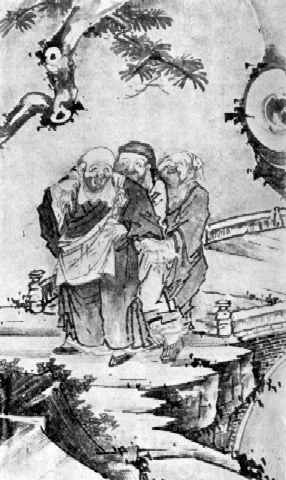"The Impact of Truth" number 33 of 200 from Robert Aitken's book Miniatures of a Zen Master.
One of the confusing aspects of studying Zen is that all the characters have multiple names. The names are not their given names but the names are made up of geographical places. Here is a case in point Aitken refers to a certain tenth century teacher as Chanyue Guanxiu then points to a translation of some of his writings and there in the translation the translator refers to the author as Zengetsu with no reference at all to Chanyue Guanxiu. Go figure?
Yet none of this is of any importance.
Zengetsu , is famous for his powerful "Suggestions for Zen Students" and I'll quote it here in its entirety.
Aitken Roshi was moved to write about the line "Modesty is the foundation of all virtues. Let your neighbors find you before you make yourself known to them." Nice one! Modesty and quietude are foundational. When expressed, life flows. Trouble ensues when immodest.
I'm moved by the line "Even though you are alone in a dark room, conduct yourself as though you are facing a noble guest." How do I conduct myself when alone, when I know nobody is watching? Sometimes not so upright. Plenty to explore here.
Which 'suggestion' moves you?
One of the confusing aspects of studying Zen is that all the characters have multiple names. The names are not their given names but the names are made up of geographical places. Here is a case in point Aitken refers to a certain tenth century teacher as Chanyue Guanxiu then points to a translation of some of his writings and there in the translation the translator refers to the author as Zengetsu with no reference at all to Chanyue Guanxiu. Go figure?
Yet none of this is of any importance.
Zengetsu , is famous for his powerful "Suggestions for Zen Students" and I'll quote it here in its entirety.
Suggestions for Zen Students
by Zengetsu
Translated by Nyogen Senzaki
Living in the world, yet not clinging to or forming attachments for the dust of the world, this is the way of a true Zen student.
In witnessing the good actions of another person, encourage yourself to follow their example. In hearing of the mistaken action of another person, advise yourself not to emulate it.
Even though you are alone in a dark room, conduct yourself as though you are facing a noble guest.
Express your feelings, but never become more expressive than your true nature.
Poverty is your treasure. Do not exchange it for the easy life.
A person may look like a fool and yet not be stupid. They may be conserving their wisdom and guarding it carefully.
The virtues are the fruits of self-discipline, and do not drop from heaven of themselves like rain or hail.
Modesty is the foundation of all virtues. Let your neighbors find you before you make yourself known to them.
A noble heart never forces itself forward. Its words are as rare gems seldom displayed.
Every day is a fortunate day for a true student. Time passes but they never lag behind.
Neither glory nor shame can move their heart.
Do not discuss right or wrong. Always censure yourself, never another.
Some things, although right, were considered wrong for many generations. Since the value of righteousness may be recognized after centuries, there is no need to crave immediate appreciation.
Why do you not leave everything to the great law of the universe and pass each day with a peaceful smile?
Aitken Roshi was moved to write about the line "Modesty is the foundation of all virtues. Let your neighbors find you before you make yourself known to them." Nice one! Modesty and quietude are foundational. When expressed, life flows. Trouble ensues when immodest.
I'm moved by the line "Even though you are alone in a dark room, conduct yourself as though you are facing a noble guest." How do I conduct myself when alone, when I know nobody is watching? Sometimes not so upright. Plenty to explore here.
Which 'suggestion' moves you?
.jpg)







